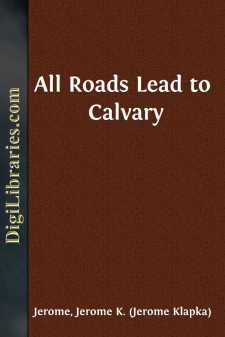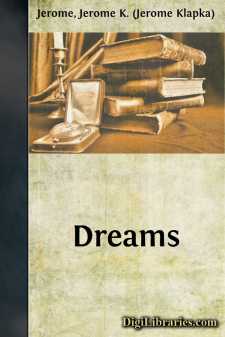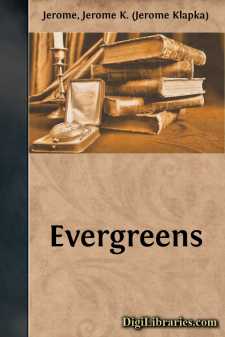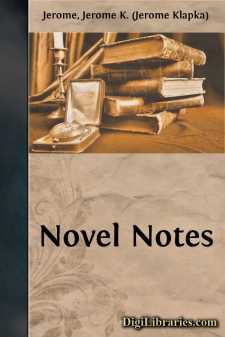Categories
- Antiques & Collectibles 13
- Architecture 36
- Art 48
- Bibles 22
- Biography & Autobiography 813
- Body, Mind & Spirit 142
- Business & Economics 28
- Children's Books 17
- Children's Fiction 14
- Computers 4
- Cooking 94
- Crafts & Hobbies 4
- Drama 346
- Education 46
- Family & Relationships 57
- Fiction 11829
- Games 19
- Gardening 17
- Health & Fitness 34
- History 1377
- House & Home 1
- Humor 147
- Juvenile Fiction 1873
- Juvenile Nonfiction 202
- Language Arts & Disciplines 88
- Law 16
- Literary Collections 686
- Literary Criticism 179
- Mathematics 13
- Medical 41
- Music 40
- Nature 179
- Non-Classifiable 1768
- Performing Arts 7
- Periodicals 1453
- Philosophy 64
- Photography 2
- Poetry 896
- Political Science 203
- Psychology 42
- Reference 154
- Religion 513
- Science 126
- Self-Help 84
- Social Science 81
- Sports & Recreation 34
- Study Aids 3
- Technology & Engineering 59
- Transportation 23
- Travel 463
- True Crime 29
Jerome K. (Jerome Klapka) Jerome
Jerome Klapka Jerome was an English writer and humorist best known for his comic travelogue "Three Men in a Boat," published in 1889. His works often feature light-hearted and witty observations on everyday life and human nature, which made him popular during the late Victorian and Edwardian eras. Jerome also wrote plays, essays, and other novels, contributing significantly to English humor literature.
Author's Books:
Sort by:
CHAPTER I She had not meant to stay for the service. The door had stood invitingly open, and a glimpse of the interior had suggested to her the idea that it would make good copy. “Old London Churches: Their Social and Historical Associations.” It would be easy to collect anecdotes of the famous people who had attended them. She might fix up a series for one of the religious papers. It...
more...
CLOCKS. There are two kinds of clocks. There is the clock that is always wrong, and that knows it is wrong, and glories in it; and there is the clock that is always right—except when you rely upon it, and then it is more wrong than you would think a clock could be in a civilized country. I remember a clock of this latter type, that we had in the house when I was a boy, routing us all up at three...
more...
PREFACE Said a friend of mine to me some months ago: “Well now, why don’t you write a sensible book? I should like to see you make people think.” “Do you believe it can be done, then?” I asked. “Well, try,” he replied. Accordingly, I have tried. This is a sensible book. I want you to understand that. This is a book to improve your mind. In this book I tell you all about...
more...
The most extraordinary dream I ever had was one in which I fancied that, as I was going into a theater, the cloak-room attendant stopped me in the lobby and insisted on my leaving my legs behind me. I was not surprised; indeed, my acquaintanceship with theater harpies would prevent my feeling any surprise at such a demand, even in my waking moments; but I was, I must honestly confess, considerably...
more...
They look so dull and dowdy in the spring weather, when the snow drops and the crocuses are putting on their dainty frocks of white and mauve and yellow, and the baby-buds from every branch are peeping with bright eyes out on the world, and stretching forth soft little leaves toward the coming gladness of their lives. They stand apart, so cold and hard amid the stirring hope and joy that are throbbing...
more...
DOES THE YOUNG MAN KNOW EVERYTHING WORTH KNOWING? I am told that American professors are "mourning the lack of ideals" at Columbia University—possibly also at other universities scattered through the United States. If it be any consolation to these mourning American professors, I can assure them that they do not mourn alone. I live not far from Oxford, and enjoy the advantage of occasionally...
more...
ON BEING IDLE. Now, this is a subject on which I flatter myself I really am au fait. The gentleman who, when I was young, bathed me at wisdom's font for nine guineas a term—no extras—used to say he never knew a boy who could do less work in more time; and I remember my poor grandmother once incidentally observing, in the course of an instruction upon the use of the Prayer-book, that it was...
more...
CHAPTER I. If you take the Underground Railway to Whitechapel Road (the East station), and from there take one of the yellow tramcars that start from that point, and go down the Commercial Road, past the George, in front of which starts—or used to stand—a high flagstaff, at the base of which sits—or used to sit—an elderly female purveyor of pigs’ trotters at three-ha’pence apiece, until you...
more...
"I do mean it," declared Mrs. Korner, "I like a man to be a man." "But you would not like Christopher—I mean Mr. Korner—to be that sort of man," suggested her bosom friend. "I don't mean that I should like it if he did it often. But I should like to feel that he was able to be that sort of man.—Have you told your master that breakfast is ready?" demanded Mrs....
more...
PROLOGUE Years ago, when I was very small, we lived in a great house in a long, straight, brown-coloured street, in the east end of London. It was a noisy, crowded street in the daytime; but a silent, lonesome street at night, when the gas-lights, few and far between, partook of the character of lighthouses rather than of illuminants, and the tramp, tramp of the policeman on his long beat seemed to...
more...











